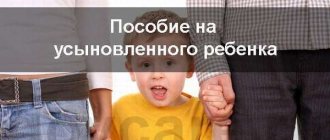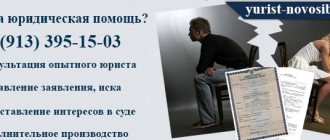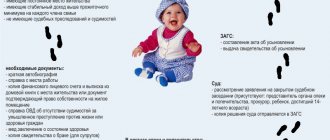The decision to adopt an adopted child into a family is a very responsible step, requiring not only absolute confidence in one’s intentions, but also unshakable determination.
Future adoptive parents have to go through a difficult path until they can take the hand of a new family member.
After all, the requirements for foster families are the most stringent. When transferring a child to a family, guardianship and trusteeship authorities must be confident in the trustworthiness of the adoptive parents.
Dear readers! To solve your problem right now, get a free consultation
— contact the duty lawyer in the online chat on the right or call: +7 Moscow and region.
+7 St. Petersburg and region. 8 Other regions of the Russian Federation You will not need to waste your time and nerves
- an experienced lawyer will take care of all your problems!
Requirements for a foster family
The state is very loyal to the desire to adopt a child left without parental care. Therefore, there are no strict requirements for adoptive parents in terms of age, marital status, or number of children in the family of future parents. But at the same time, there is a list that limits a number of people’s ability to adopt a foster child.
Who cannot act as foster parents:
- incompetent or partially capable persons recognized as such by a court decision;
- persons previously deprived of parental rights or limited in them;
- persons previously removed from the duties of a guardian for improper performance of their duties;
- former adoptive parents, if the adoption was canceled due to their fault;
- disabled persons;
- persons with diseases that prevent the child from being in the family. Such diseases include tuberculosis, infectious diseases, malignant neoplasms, mental disorders, drug and alcohol addiction;
- persons who do not have an income corresponding to the subsistence level;
- persons who have or have had a criminal record.
These criteria are intended to protect children left without parental care from unscrupulous adoptive parents and unfavorable living conditions, and not to identify the most preferable persons among candidates.
The procedure for transferring a child to a foster family
In order to legally organize the transfer of a minor to a foster family, the following conditions and measures must be complied with:
- The minor is under 18 years of age.
- Within 20 days from the acceptance of the application, the PLO is required by law to give an answer about the possibility of transferring the minor (children) to a foster family.
- An examination of the living conditions in a large family showed a satisfactory condition of the living quarters, no problems were identified, and the presence of everything necessary for living and maintaining one more family member.
- The agreement was formulated with the support of the PLO and studied by both parties; an agreement was reached on all points (and on payments), including on the issue of remuneration for adoptive parents.
- The minor is informed about placement in a foster family and does not protest against it.
- Members of the foster family are informed of their responsibility for the life, health, mental state and decent maintenance of the minor.
Age of adoptive parents
According to the Family Code of the Russian Federation, adult persons cannot be adoptive parents.
There is no upper age limit for adoptive parents. That is, any adult has the right to apply for the adoption of a child into the family.
But the guardianship and trusteeship authorities, as well as psychologists conducting interviews, will take into account the age characteristics of candidates for adoptive parents. State authorities do not have the right to refuse adoption on the basis of age.
But there are situations when, for example, according to the conclusion of a psychologist, candidates are prohibited from adopting children of a certain age category (most often minors) and are offered to accept into the family a child who meets the recommendations.
Rights and responsibilities of foster parents
The child’s parents or persons replacing them lose their rights and obligations to represent and protect the rights and legitimate interests of the child from the moment the rights and obligations of a guardian or trustee arise.
Guardians are the legal representatives of their wards and have the right to defend the rights and legitimate interests of their wards in any relationship without special authority.
The trustee can act as the legal representative of his or her ward.
Guardians of minor citizens assist their wards in exercising their rights and fulfilling their duties, and also protect them from abuse by third parties.
In the event of a ward’s temporary absence from the place of residence, in particular in connection with study or stay in a medical organization, stay in places of serving a sentence, the exercise of the rights and fulfillment of the duties of a guardian or trustee in relation to the ward does not cease.
Both guardians and trustees are required to:
- take care of the maintenance of the wards (i.e. provide them with food, clothing, etc.);
- provide the ward with care and treatment;
- take care of the child’s upbringing (his mental, spiritual and moral development); a guardian or trustee has the right to independently determine the ways of raising a child under guardianship or trusteeship, taking into account the opinion of the child and the recommendations of the guardianship and trusteeship authority;
- ensure that the child receives basic general education; The guardian or trustee has the right to choose the educational organization and form of education of the child, taking into account the child’s opinion before he receives general education. Take care of the child’s health and physical development;
- take care of the child’s communication with his relatives and regulate the order of communication (if this communication does not contradict the interests of the child);
- represent and protect the rights and interests of the child.
These are actual actions that, in accordance with Article 36 of the Civil Code of the Russian Federation, guardians and trustees of minors are required to perform. Legal actions of guardians (trustees) are aimed at protecting the rights and legally protected interests of wards.
Guardians and trustees are obliged to protect the interests of their wards, and, therefore, have the right and obligation:
- Submit applications for payment of benefits and pensions due to the ward;
- file claims in court for the recovery of alimony from persons obligated by law to support the ward;
- take measures to protect the property rights of the ward (file claims to reclaim his property from someone else’s illegal possession, to recognize the right of ownership, etc.);
- The guardian and trustee are obliged to take care of the ward’s property transferred to them as if it were their own, to prevent a decrease in the value of the ward’s property and to facilitate the extraction of income from it.
- make demands for compensation for harm caused to the health of the ward or his property, for compensation for moral damage caused to the ward;
- apply to medical, educational and other institutions in order to receive medical, educational and other services for the ward, both free of charge and on a paid basis;
- protect the housing rights of the ward by filing claims for his/her move-in, for the eviction of persons who do not have the right to live in the ward’s residential premises, filing an application for providing the ward with residential premises, etc.;
- submit a statement to all other citizens, organizations, state and local government bodies, and officials in cases of violation of the rights of the ward or the threat of such a violation.
Guardians and trustees are not entitled to:
- the guardian, trustee, their spouses and close relatives do not have the right to enter into transactions with the ward, with the exception of the transfer of property to the ward as a gift or for free use;
- represent the ward when concluding transactions or conducting legal cases between the ward and the spouse of the guardian or trustee and their close relatives;
- a guardian or trustee does not have the right to prevent a child from communicating with his parents and other relatives, except in cases where such communication does not meet the interests of the child;
- wards do not have the right of ownership to the property of guardians or trustees, and guardians or trustees do not have the right of ownership to the property of wards, including the amounts of alimony, pensions, benefits and other social payments provided for the maintenance of wards;
- The guardian does not have the right to enter into a credit agreement and a loan agreement on behalf of the ward, who acts as a borrower, and the trustee does not have the right to give consent to the conclusion of such agreements, except in cases where the loan is required for the purpose of maintaining the ward or providing him with living quarters. A credit agreement, a loan agreement on behalf of the ward in these cases are concluded with the prior permission of the guardianship and trusteeship authority;
- The guardian does not have the right to enter into an agreement on the transfer of the ward’s property for use, and the trustee does not have the right to give consent to the conclusion of such an agreement if the period of use of the property exceeds five years. In exceptional cases, the conclusion of an agreement on the transfer of the ward’s property for use for a period of more than five years is permitted with the prior permission of the guardianship and trusteeship authority in the presence of circumstances indicating the special benefit of such an agreement, unless a different deadline is established by federal law;
- the guardian, without the prior permission of the guardianship and trusteeship authority, has no right to carry out, and the trustee has no right to give consent to, transactions for the rental of the ward’s property for rent, lease, free use or collateral, for the alienation of the ward’s property (including exchange or donation) , making transactions entailing the renunciation of the rights belonging to the ward, the division of his property or the allocation of shares from it, and the completion of any other transactions entailing a decrease in the value of the ward’s property.
Prior permission from the guardianship and trusteeship authority is also required in all other cases if the actions of the guardian or trustee may result in a decrease in the value of the ward’s property.
Guardians and trustees have the right:
- A guardian or trustee has the right to demand, on the basis of a court decision, the return of a child under guardianship or trusteeship from any persons holding the child without legal grounds, including from parents or other relatives or adoptive parents of the child.
- The guardian has the right to deposit the ward's funds, and the trustee has the right to give consent to the deposit of the ward's funds only to credit organizations, at least half of the shares (shares) of which belong to the Russian Federation.
In the interests of the ward, the guardianship and trusteeship authority in the act of appointing a guardian or trustee or in the agreement on the implementation of guardianship or trusteeship may indicate certain actions that the guardian or trustee does not have the right to perform, including prohibiting the guardian or trustee from changing the place of residence of the ward, as well as in order to take into account the individual characteristics of the ward, establish mandatory requirements for the exercise of the rights and performance of the duties of a guardian or trustee, including such requirements that determine the specific conditions for the upbringing of a minor ward.
Any actions (inaction) to exercise guardianship or trusteeship by a guardian or trustee of a child may be appealed by parents or other relatives or adoptive parents of the child to the guardianship and trusteeship authority.
If the guardian or trustee does not obey the decision of the guardianship and trusteeship authority, the parents or other relatives or adoptive parents of the child have the right to apply to the court with a demand to protect the rights and legitimate interests of the child and (or) their rights and legitimate interests.
Failure to comply with a court decision is grounds for removing a guardian or trustee from performing their duties.
Responsibilities of guardians and trustees:
- Guardians are responsible for transactions made on behalf of the wards.
- Guardians and trustees are responsible for damage caused through their fault to the person or property of the ward.
If it is discovered that the guardian or trustee has improperly fulfilled the duties of protecting the property of the ward and managing the property of the ward (damage, improper storage of property, spending property for other purposes, taking actions that entailed a decrease in the value of the ward’s property, etc.), the guardianship and trusteeship body is obliged to draw up a report. this act and present a demand to the guardian or trustee for compensation for losses caused to the ward.
Guardians and trustees bear criminal liability and administrative liability for their actions or inactions in the manner established, respectively, by the legislation of the Russian Federation and the legislation of the constituent entities of the Russian Federation.
Change of place of residence of the guardian (trustee) and ward
When changing the place of residence of a ward, the guardianship and trusteeship authority that established guardianship or trusteeship is obliged to forward the ward’s case to the guardianship and trusteeship authority at his new place of residence within three days from the date of receipt from the guardian or trustee of the notice of the change of place of residence of the ward.
Guardians or trustees are required to notify the guardianship and trusteeship authorities of a change in the place of residence of their wards no later than the day following the day the wards leave their previous place of residence.
The powers of the guardianship and trusteeship body at the new place of residence of the ward are assigned to the guardianship and trusteeship body at the new place of residence from the date of receipt of the ward’s personal file (including the payment of a monthly allowance for the maintenance of a child in the guardian’s family).
Control over the living conditions and upbringing of a minor in the family of a guardian (trustee)
In order to supervise the activities of guardians, the guardianship and trusteeship authority at the place of residence of the ward carries out scheduled and unscheduled inspections of the living conditions of wards, compliance by guardians with the rights and legitimate interests of wards, ensuring the safety of their property, as well as compliance by guardians with the requirements for the exercise of their rights and the performance of their duties .
Scheduled inspections are carried out by an authorized specialist of the guardianship and trusteeship authority on the basis of an act of the guardianship and trusteeship authority on conducting a scheduled inspection.
When a ward is placed under guardianship or trusteeship, a routine check is carried out in the form of a visit to the ward:
1 time during the first month after the guardianship and trusteeship authority makes a decision to appoint a guardian;
1 time every 3 months during the first year after the guardianship and trusteeship authority makes a decision to appoint a guardian;
Once every 6 months during the second year and subsequent years after the guardianship and trusteeship authority makes a decision to appoint a guardian.
When conducting scheduled and unscheduled inspections, an assessment is made of the living conditions of the ward, his state of health, appearance and hygiene, emotional and physical development, self-care skills, family relationships, and the family’s ability to meet the developmental needs of the ward.
When receiving oral or written requests from legal entities and individuals containing information about the guardian’s non-fulfillment or improper performance of his duties or about the violation of the rights and legitimate interests of the ward, the guardianship and trusteeship authority has the right to conduct an unscheduled inspection.
An unscheduled inspection is carried out by an authorized specialist of the guardianship and trusteeship authority on the basis of an act of the guardianship and trusteeship authority on conducting an unscheduled inspection.
If the place of residence of a ward changes, the guardianship and trusteeship authority at his new place of residence, upon receiving the personal file of the ward, is obliged to conduct an unscheduled inspection within 3 days from the date of its receipt.
In case of separate residence of trustees and their minor wards, in accordance with Article 36 of the Civil Code of the Russian Federation, an inspection is carried out at the place of residence of the ward.
Based on the results of the inspection, an act is drawn up to verify the living conditions of the ward, the guardian’s compliance with the rights and legitimate interests of the ward, ensuring the safety of his property, as well as the guardian’s fulfillment of the requirements for the exercise of his rights and the performance of his duties.
If facts of non-fulfillment or improper fulfillment by the guardian of the duties provided for by the legislation of the Russian Federation are revealed, or violation of the rights and legitimate interests of the ward, the act of checking the living conditions of the ward additionally indicates:
- a list of identified violations and deadlines for their elimination;
- recommendations to the guardian on taking measures to improve the living conditions of the ward and the fulfillment by the guardian of the duties assigned to him;
- proposals to hold the guardian accountable for failure to fulfill or improper performance of his duties provided for by the legislation of the Russian Federation (if necessary).
The act of checking the living conditions of the ward is drawn up within 10 days from the date of its conduct, signed by the authorized specialist of the guardianship and trusteeship body who conducted the check and approved by the head of the guardianship and trusteeship body.
The act of checking the living conditions of the ward is drawn up in 2 copies, one of which is sent to the guardian or to an organization for orphans within 3 days from the date of approval of the act, the second is stored in the guardianship and trusteeship authority.
The act of checking the living conditions of the ward may be challenged by the guardian in court.
If the actions of the guardian are carried out in violation of the legislation of the Russian Federation and (or) cause harm to the health, physical, psychological and moral development of the ward, and also if the violations identified as a result of the inspection cannot be eliminated without termination of guardianship or trusteeship, the guardianship and trusteeship body within 3 days from the date of inspection:
a) adopts an act on the release of the guardian from the performance of the duties assigned to him or on his removal from their performance, which is sent to the guardian;
b) takes measures for the temporary placement of the ward (if necessary);
c) decides to place the ward in another family or in an organization for orphans.
In the event of an immediate threat to the life or health of a ward, the guardianship and trusteeship authority has the right to immediately take him away from the guardian in the manner established by the family legislation of the Russian Federation.
Wards have the right to appeal to the guardianship and trusteeship authority the actions or inactions of guardians or trustees.
Guardian or Conservator's Report
The guardian or trustee annually, no later than February 1 of the current year, unless another period is established by the agreement on guardianship or trusteeship, submits to the guardianship and trusteeship body a report in writing for the previous year on the storage, use of the ward’s property and on the management of the ward’s property with an appendix documents (copies of sales receipts, tax receipts, insurance amounts and other payment documents).
A report on the safety and management of the ward’s property is submitted to the guardianship and trusteeship authorities by all guardians and trustees, without exception, including adoptive parents and foster carers.
The report provides for the provision of information about the income of the ward and expenses made by the guardian or trustee, about the alienation, acquisition and use of property (real and movable), about the safety of the ward’s property, etc.
The approved report form provides for sections for all possible types of property of the ward.
However, the guardian or trustee fills out in the said report only those sections that relate to expenses incurred by him (other actions taken), and only in relation to the property belonging to his ward.
It is necessary to pay attention to the fact that the report must contain, among other information, the dates of receipt of amounts from the ward’s account, the dates of expenses incurred from the amounts received from the ward’s account, and expenses for the needs of the ward. In accordance with the note to paragraph 8 of the report, if it is impossible to provide payment and other documents confirming the current expenses of the guardian (trustee), or in the case of the purchase of food products, the guardian (trustee) has the right to attach to the report a receipt in simple written form about the expenses incurred by him during the reporting period. period.
If a ward who has reached the age of fourteen years personally receives the funds due to him in the form of pensions, benefits, alimony, then the guardian or trustee does not report for these funds and attaches to the report a receipt in simple written form confirming that the corresponding funds the ward receives it personally and spends it on personal needs.
Special requirements established by Article 25 of the Federal Law of April 28, 2008 No. 48-FZ “On Guardianship and Trusteeship”, regarding the obligation of guardians or trustees to annually provide a written report on the storage, use of the ward’s property and on the management of the ward’s property, apply exclusively to guardians or trustees of minor citizens - that is, to persons who are specially appointed by the guardianship and trusteeship authority in order to protect the rights and interests of citizens who need to establish guardianship or trusteeship over them.
The form of the report of the guardian or trustee on the storage, use of the property of a minor ward and on the management of such property was approved by Decree of the Government of the Russian Federation of May 18, 2009 No. 423 “On certain issues of guardianship and trusteeship in relation to minor citizens.”
Termination of guardianship and trusteeship
Guardianship or trusteeship is terminated:
- in the event of the death of a guardian or trustee or ward;
- upon expiration of the act of appointment of a guardian or trustee;
- upon release or removal of a guardian or trustee from the performance of their duties;
- in cases provided for in Article 40 of the Civil Code of the Russian Federation.
Guardianship of the children of minor parents is terminated on the grounds stated above, as well as when such parents reach the age of eighteen and in other cases they acquire full civil capacity before reaching adulthood.
A guardian or trustee may be released from performing their duties at their request.
The guardianship and trusteeship authority may relieve a guardian or trustee from performing their duties, including temporarily, in the event of conflicts between the interests of the ward and the interests of the guardian or trustee.
The guardianship and trusteeship authority has the right to remove a guardian or trustee from the performance of their duties.
Removal of a guardian or trustee from the performance of their duties is permitted in the following cases:
- improper performance of the duties assigned to them;
- violation of the rights and legitimate interests of the ward, including when exercising guardianship or trusteeship for personal gain or leaving the ward without supervision and necessary assistance;
- detection by the guardianship and trusteeship body of facts of a significant violation by the guardian or trustee of the rules established by federal law or an agreement for the protection of the property of the ward and (or) the disposal of his property.
An act of the guardianship and trusteeship body on the release of a guardian or trustee from the performance of duties assigned to them or on their removal from the performance of duties assigned to them may be challenged by the person in respect of whom it was adopted in court.
Can a pensioner become a foster parent?
Legislation does not prohibit people of retirement age from adopting.
But it must be remembered that guardianship authorities always act in the interests of the child. Each individual case is examined individually.
The candidate for adoptive parents will have to prove the ability to pay enough attention to the child and provide him with everything he needs for a long time.
If there is no confidence in one’s own capabilities, or the guardianship authorities oppose such adoption, it is worth considering other options for placing children, for example, guardianship or guest regime.
If a pensioner is a foster parent, he will directly participate in the life and upbringing of the child, but at the same time, the guardianship authorities will be able to control the child’s life outside the child care institution and, if necessary, adjust it.
Stages of child adaptation
Psychologists distinguish three main stages:
- “honeymoon” , which lasts from several days to six months. Here the child tries in every possible way to please his adoptive parents so that they do not abandon him. Usually it all starts at the time of the first meetings, when contact is established with the minor. At this stage, you need to tell how life works, what the rules are in this family, and surround the baby with care;
- regression _ This is the most difficult time for everyone. The child begins to show his ego, and the adoptive parents understand that the adopted behavior patterns are ineffective and require changes. It is necessary to establish dialogue and negotiate in order to maintain relationships. It is also important to remain warm towards your adopted child;
- recovery . After the crisis period has passed and behavior in the family has changed, relations between the parties improve. At the same time, the child begins to really trust his new parents.
Experts say that the adaptation process can last up to five years.
Full family
In the family arrangement of orphans, preference is, of course, given to families as close as possible to the portrait of the ideal unit of society: young healthy couples, distinguished by education and creating a good impression of themselves.
Family completeness is also a preferred quality, but is not a strict selection criterion. A single candidate can freely apply for the role of an adoptive parent.
Today, the practice of transferring a child to one adoptive parent is quite widespread, and the guardianship authorities, trying to improve the living conditions of children, do not interfere with this.
It is important to understand how difficult the process of raising a child in a single-parent family is. The adoptive parent will have to make a lot of efforts to fill the gaps associated with the lack of participation of one of the parents.
Models of educational activities
Currently, there are three options for raising children in families who are deprived of traditional care:
- adoption;
- guardianship (guardianship);
- foster family.
Some subjects of the Russian Federation used the rights granted to them, providing for the transfer of children to foster families.
Traditional family (registered marriage, traditional orientation)
Article 127 of the Family Code of the Russian Federation provides clear explanations on the issue of adoption of children by couples who are not in a registered marriage.
Joint adoption is possible only by traditional families who have duly registered the marriage with the civil registry office.
Cohabitation is not equivalent to a family, but in this case nothing prevents adoption by only one person. In this case, the second person will not act as a documented parent.
The article pays special attention to couples with non-traditional sexual orientation. Russian legislation prohibits joint adoption of a child by persons of the same sex, regardless of whether the marriage is registered. For this reason, non-traditional foreign families cannot apply to accept Russian children into the family.
New house
Since 2014, the city has launched a unique pilot project to provide financial support to foster families who have adopted five or more children aged 10 years or older or disabled children. Within its framework, foster families receive apartments based on 18 square meters. m per person. Within 10 years, parents must take in additional adopted children to replace those who have reached their 18th birthday. After this period expires, the apartment becomes their property. During the implementation of the project, 46 families became participants, who took in 286 children.
Physical and mental health
Maximum attention is paid to the health of candidates for adoptive parents.
This not only helps to protect the children being placed, but also guarantees the physical and mental capabilities of candidates to properly raise a foster child.
All candidates for adoptive parents are required to provide the guardianship and trusteeship authorities with a medical report issued by a licensed medical institution.
A medical examination includes a therapist, an infectious disease specialist, a phthisiatrician, a psychiatrist and a narcologist. In addition, it will be necessary to donate blood to check for HIV infection and hepatitis B and C. As you can see, the procedure for adopting a child does not require perfect health of all body systems.
Candidates may well have, for example, eye diseases or problems with the digestive system. Such diseases will not be an obstacle to accepting a child into the family. A medical report confirms that the candidate does not have any diseases that directly impede adoption.
An examination by a psychiatrist is one of the most important moments of a medical examination.
Undiagnosed mental disorders in candidates can have disastrous consequences for adopted children.
Any confirmed psychiatric diagnosis will be a barrier to adoption, even in the case of long-term remission.
You can undergo a medical examination not only in government institutions, but also in any accredited medical organization.
Preparation of adoptive parents
If a person is not a close relative of the child and has not yet adopted or taken custody of someone else, he is required to undergo special training for adoptive parents. The training program is common to everyone.
In Russia there are no schools yet that would specifically train foster parents who take in children with certain diagnoses, as is the case in the West, noted Yulia Yudina.
“In the West, in the training system for foster parents who take, say, a child with cerebral palsy, quite a lot of time and attention is paid to how to care for a child with cerebral palsy. A separate course is provided for parents aiming to adopt a child with Down syndrome. And so on,” she explained.
The director of the foundation added that she hopes that specialized schools for foster parents will soon appear in Russia.
No alcohol or drug addiction
It is obvious that persons suffering from alcohol and drug addiction cannot raise a child and create acceptable living conditions for him.
In this regard, when considering candidates, a mandatory condition is a conclusion from a narcologist.
You should not hope for adoption if the future parent is registered in a psycho-drug dispensary.
Adoption
The main type of raising children who find themselves without parental supervision, as well as orphans, is the adoption of a child.
This option is a separate type of upbringing in the family and has an indefinite nature. This device is associated with the emergence of long-term, often lifelong, communication between the child and strangers. What is the basis for the formation of a foster family?
Adoption is a form of upbringing that results in the creation of living conditions that are similar to the conditions for the development of natural children.
No outstanding criminal record or problems with the law
Not a single adoption procedure is complete without a conclusion that the candidate has no criminal record. The presence of problems with the law casts doubt on the candidate’s ability to give the child a proper upbringing and instill in him a lifestyle that meets the norms of society. We are also talking about expunged criminal records.
But not every criminal record will be an obstacle to making a positive decision on the issue of adoption. If the crimes committed were classified as minor or moderate, the court, taking into account other circumstances, may authorize the adoption. A stable financial position sufficient to support a family
The financial situation of future adoptive parents is confirmed by a certificate from their place of work or a declaration of income. To be allowed to accept a child into a family, you do not need exorbitant income. Wages must be stable, and their size should not be less than the subsistence minimum established in the subject.
Future parents should objectively assess their capabilities. Insufficient income can become a problem after a successful adoption procedure, especially if there is more than one child in the family.
What if a disabled person is being adopted?
Are there any special requirements for adoptive parents who want to adopt a child with special needs? Yulia Yudina , director of the Change One Life foundation, answered this question to Miloserdiyu.ru “There are no additional requirements for them if it is a child without restrictions related to his physical activity, if it is not necessary to equip the room with some kind of ramps or special doorways for the stroller to pass through,” she said.
Yulia Yudina
Anton Zharov noted in an interview with Miloserdiy.ru , guardianship authorities decide not only whether potential guardians meet general criteria, but also “whether this family and the living conditions in it are suitable for a particular child.”
For example, if a family has cramped living conditions, “a child in a stroller will not be able to turn around in a tiny apartment,” the lawyer explained. “There is a child’s right to live in a family, but there is no right for a specific family to take a specific child from an orphanage just because they want it,” he emphasized.
Availability of living space that meets sanitary standards
To successfully complete the adoption procedure, candidates must have a permanent place of residence.
The Housing Code or other regulations do not provide for any clear standards for the compliance of residential premises.
However, checking living conditions is mandatory for adoptive parents. The assessment of the suitability of housing for a child’s residence is carried out at the discretion of the persons conducting the inspection.
By the time the inspection is carried out, the foster family can create conditions for the child - it is advisable to equip a nursery or at least a separate sleeping place, as well as purchase a certain number of toys. This will make it clear to the reviewers that your intentions are serious and thoughtful. Unsanitary conditions in residential premises are unacceptable.
Those conducting the inspection will especially carefully evaluate the safety of the child within the walls of the house. Approach this issue responsibly.
Conditions for appointing guardianship
The legislation provides a clear answer to who exactly can be a foster family . According to the norms of legislative acts, obtaining such status is possible for the following persons:
- Ordinary families with minor children or elderly parents.
- Families in which, for some objective reason (for example, due to medical health), do not have a child of their own.
- Separate cells in which there is only the father, or only the mother.
- Single persons who have citizenship of the Russian Federation.
- Persons who permanently live together and have the status of civil spouses.
In addition, obtaining such status is possible only if the following prerequisites are met:
- Parents must be officially employed.
- Guardians should not have any illness restrictions that affect the ability to care for and raise a minor.
The essence of creation
A foster family is formed on the basis of the Family Code, as well as the Federal Law concerning guarantees for the protection of children.
Individuals or spouses who wish to take one or more children who have lost parental care into a new foster family are legally considered foster parents.
A child who is given to a new family is an adopted child.
Problems of adoptive families
Let's consider the main problems of this form of family education of children who are left without parental care. Not all children who need adoption end up in foster families. Practice shows that healthy infants have a great chance. Sick children, as well as children who have crossed the threshold of infancy, continue to live in orphanages, or they are adopted by citizens of foreign countries.
Other individual forms of family education - guardianship (trusteeship) of patronage and foster families - are urgent in nature; they are a temporary placement of children who are left without parental supervision, as well as orphans, into a family.










